
Mathisms by Allison E. '27
and other linguistic quirks of the nerd incubator
There exists a nontrivial subset of the MIT population for whom the intersection of their everyday language and mathematical jargon is non-empty.
In other words, MIT is overrun with math people who cannot help but speak in tongues math gibberish. It’s almost inevitable in this little cauldron of nerds. You start with a soup of universally strong math backgrounds, then toss in a couple hundred ultra math nerds, and a couple hundred more ultra ultra math nerds, and suddenly you can smell the scent of math wafting into the next room. It’s in the name, after all–the Mathachusetts Institute of Technology.
Now, you may have heard of some of our linguistic quirks before. For example, many know that MIT’s buildings aren’t named, but rather numbered. Or that we introduce our majors by number (“I’m a Course 1601 Aero/Astro major ”). Or that we throw around class numbers with reckless abandon02 Guys, please stop abbreviating 18.701 to 701, I keep thinking you’re talking about biology . But that’s only scratching the tip of the surface here. It gets much worse.
However, as the token non-math person of a very mathy friend group, today I shall serve as a questionably accurate translator between you, dear reader, and the cauldron math degeneracy. This is not a rigorous03 realized after the fact that this is also a mathism LOL case study, but it does use (mostly) real quotes I’ve heard around campus. Let us begin :)
orthogonal
Example: “This is almost orthogonal to the previous discussion”
Translation: “This is almost completely unrelated to the previous discussion”
Explanation: In math, ‘orthogonal’ means perpendicular, or forming a right angle with something. People generally use it to mean ‘unrelated,’ the way ‘tangential’ is used to mean ‘only vaguely related before branching off completely into lalaland’ (the way that a line tangent to a circle moves with the circle for only a moment before diverging). 9/10
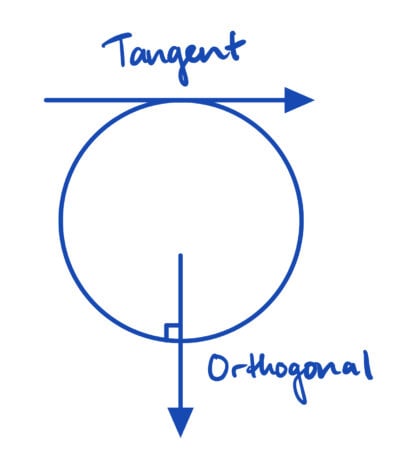
this reminds me of too many math problems
there exists
Example: “There exists a future in which I drop this class”
Translation: “I might drop this class”
Explanation: ‘There exists’ is just a fancy way to say ‘there is,’ while simultaneously making the syntax way more complicated than necessary. It’s just a way to sound fancy. 5/10
subset
Example: “This is just a subset of my thoughts”
Translation: “These are just some of my thoughts”
Explanation: According to Wikipedia, a set A is a subset of a set B if all elements of A are also elements of B. For example, ‘dogs’ are a subset of ‘mammals’ because all dogs are mammals. ‘Mammals’ is not a subset of ‘dogs,’ because not all mammals are dogs. I think this is mainly used just to sound fancy–you can say ‘some’ with the same meaning. 6/10
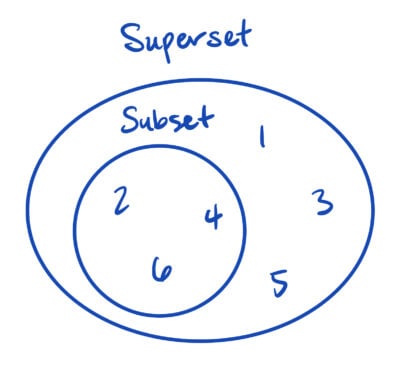
{even numbers} is a subset of {(natural) numbers}
(non)trivial
Example: “This PSet is taking me a nontrivial amount of time”
Translation: “This PSet is taking me a while”
Explanation: The word ‘trivial’ is SO common at MIT. I don’t think I ever heard it in everyday conversation before coming here, but technically some normal people do generally use it as something like ‘unimportant’ or ‘insignificant.’ In math contexts, though, ‘trivial’ generally refers to something that’s relatively simple or straightforward to show/prove. For example, a trivial solution to the Pythagorean theorem a^2+b^2=c^2 is a = 0, b = 0, and c = 0. People at MIT use both definitions–
‘insignificant’ and ‘easy’04
what exactly qualifies for these adjectives varies widely person to person… 😭
–and then apply it to everything. You cannot escape the trivial. 8/10
epsilon
Example: “It’s getting warm, I’m going to open the window by epsilon”
Translation: “I’m going to open the window a bit”
Explanation: The lowercase Greek letter epsilon (ε) is often used to denote a very small number. I’ve seen it mostly when analyzing what happens to a system (such as a pendulum) if you give it a small nudge in one direction, and in everyday conversation it means the same thing. This one is unusual in that it’s mainly a notation convention, which is kinda fun. 7/10
such that
Example: “Should the laws be changed such that the state has less power?”
Translation: “Should the laws be changed so that the state has less power?”
Explanation: I think you can usually replace ‘such that’ with ‘so that,’ but there are subtle nuances. After 20 minutes of research, contemplation, and attempted synthesis of the thoughts generated, I gave up and asked ChatGPT, who gave me an annoyingly perfect categorization: ‘so that’ refers to purpose or intention, while ‘such that’ refers to a condition or exact criteria to be met. For example, “I cooked so that I could feed all my friends” implies that the purpose is to feed all my friends, while “I cooked such that I could feed all my friends” implies that I made so much food that I satisfy the condition of being able to feed all my friends, but not necessarily that I intend to do so. Usually this nuance doesn’t matter, though. Just say ‘so that’… 5/10
n, where n is…
Example: “There are like… n mushrooms… where n is a small number”
Translation: “There’s not a lot of mushrooms”
Explanation: I simply have no explanation, and was *this* close to throwing said mushrooms at this person. -100/10
signal-to-noise ratio
Example: “My brain’s signal to noise ratio is very low”
Translation: “If I have any useful thoughts, they’re generally drowned out by the incessant muttering of my inner demons” \hj
Explanation: ‘Signal-to-noise ratio’ is a measurement of the strength of a signal to the strength of its background noise. For example, the further away you are from a radio station, the more your signal-to-noise-ratio drops and the harder it is to make out the music (signal) amidst the static (noise). I’m actually quite partial to this one–it’s so poetic. 10/10
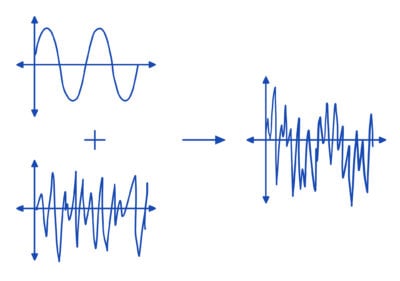
In this case, the noise is “as big” as the sinusoidal signal, making the combination of the two difficult to make out
magnitude
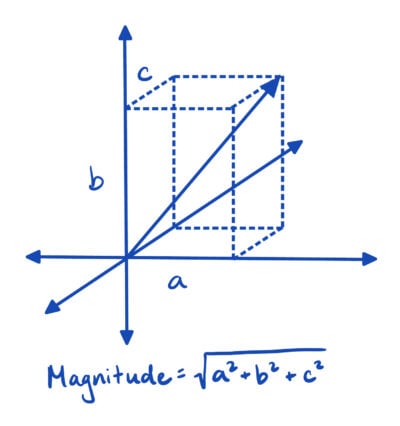
the magnitude of a vector <a, b, c> can be calculated with the Pythagorean Theorem!
Example: “I wish there were more people with Ellie-magnitude personalities”
Translation: “I wish there were more people with personalities as large/fun/cool as Ellie” (name replaced)
Explanation: In technical use, ‘magnitude’ refers to the size of something, and is often denoted as the absolute value. I don’t actually hear this one very often (besides in “this is orders of magnitude better than expected” cases), but I thought it was funny.
critical mass
Example: “We have reached critical mass to start class”
Translation: “We have enough people here that it makes sense to start class”
Explanation: In nuclear physics, critical mass is the minimum amount of material needed to keep a nuclear reaction alive. It’s a pretty good phrase for social situations, because you often need a minimum number of people to make things happen. Probably not as unique to nerd world, though. 7/10
pigeonhole principle
Example: “I’m grading this question alone–we have 8 people for 5 questions, so by pigeonhole…”
Translation: “We have 8 people for 5 questions, so there have to be at least 2 questions that only have 1 grader each.”
Explanation: According to Wikipedia, the pigeonhole principle states that if n items are put into m containers, with n > m, then at least one container must contain more than one item. It’s mainly common sense (if you have 3 pigeons and 2 holes, at least 1 hole has to have more than 1 pigeon), but it’s often used in proofs. I’ve somehow heard this come up in more than one conversation–in fact, a friend who was also present for this example anticipated where it was going and CHIMED IN SIMULTANEOUSLY with “by pigeonhole” 😭. 2/10

*coo coo*
parallelize
Example: ”Let’s parallelize–you chop the cabbage while I caramelize the onions”
Translation: “Let’s split up the tasks that can be done simultaneously–”
Explanation: In computer science, parallel processing is when you use multiple processors to do different parts of a job. In particular, though, the mini-tasks must not depend on each other–i.e. chopping cabbage doesn’t require that onions first be caramelized, or vice versa. There’s no real purpose to using ‘parallelize,’ but I think parallel processing is a cool concept, and I think it’s useful to remind ourselves that we have to work on tasks that don’t depend on each other. 9/10
intersection
Example: “When I cook, I usually just take the intersection of a bunch of recipes”
– my roommate, making the best food I’ve ever eaten because she is amazing and also my hero05
note from said roommate
Translation: “I usually look at a bunch of recipes and use the ingredients mentioned by all of them”
Explanation: In math, the ‘intersection’ of two groups is all the items that fall in both groups. For example, apples are in the intersection of [fruits] and [red things], because they’re both fruits and red things. My friend used ‘intersection’ to mean exactly this, and I actually quite like it. If you know the other person will understand it, it saves several words and a convoluted explanation. 9/10
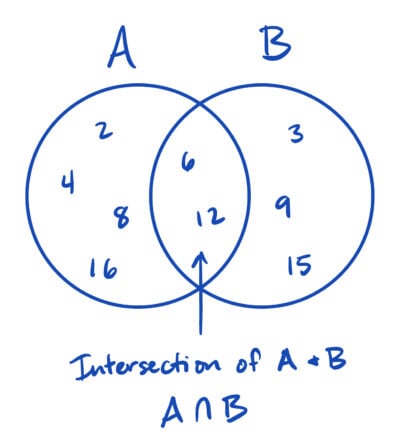
A is multiples of 2, B is multiples of 3, and the intersection is multiples of 6 :D
honorable mentions: tongue-in-cheek references to anything machine learning
Example: My friend, walking down a hill: “gradient descent!!!!”
Translation: “We’re going down a hill!!!”
Example: “He’s updating his weights!!”
Translation: “He’s changing his opinions/understanding after hearing us talk!”(?)
Example: “I need more training data to understand this >:(”
Translation: “I need more practice problems/examples/experiences”
Explanation: I’m not competent enough to actually explain all this machine learning stuff, so uhhh if you’re curious the 3Blue1Brown videos are a great intro. Suffice to say, we’ve started talking about ourselves as machine learning models… The lure of computer science has sunk its talons into us, and it’s begun to draw blood. Send help. 4/10
dishonorable mention: in which i am the culprit
Example:
My roommate: “Late days exist for a reason”
Me: “This is a true statement”
Me: *realizes what I just said*
Me: *pitches self out the nearest window*
Translation: “Yeah”
Explanation: Before coming to MIT, I would say ‘ah yeah that’s true…’ occasionally, but I’d never heard anyone except my mom say ‘this is true.’ Unfortunately, however, ‘this is true’ is SO common here, and I’ve resigned myself to falling victim. BUT STILL. I genuinely can’t believe that the words ‘this is a true statement’ passed my lips completely unironically… I suppose even I, a non-math person, am susceptible to the allure of mathisms. Either that or the
6.12106
Introduction to Algorithms, truly the bane of my existence last semester
proofs have warped my brain 😭. -20/10
- Aero/Astro major back to text ↑
- Guys, please stop abbreviating 18.701 to 701, I keep thinking you’re talking about biology back to text ↑
- realized after the fact that this is also a mathism LOL back to text ↑
- what exactly qualifies for these adjectives varies widely person to person… 😭 back to text ↑
- note from said roommate back to text ↑
- Introduction to Algorithms, truly the bane of my existence last semester back to text ↑